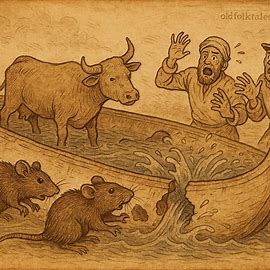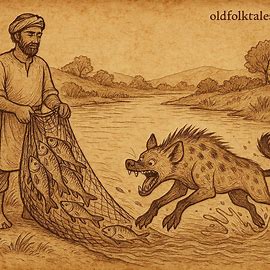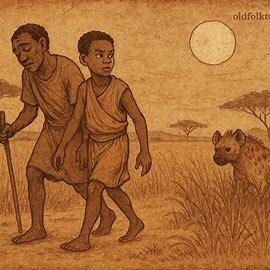Long ago, in the highlands of Madagascar, two clever rats walked proudly along a narrow path, leading four sturdy oxen by rope. Their tiny paws gripped the reins with surprising confidence, and their whiskers twitched with self-satisfaction. As they made their way toward the village, they encountered two men whose sly eyes glimmered with ambition. These men were known for trickery, always searching for easy fortune. The sight of rats commanding oxen instantly stirred their greed.
“Eh, friends!” the men called out cheerfully, hiding their true intent. “Shall we be companions?”
The rats, unsuspecting but eager for fellowship, answered gladly, “Yes, let us travel together.”
The men pretended to marvel. “But where did such small creatures as you get such fine oxen?”
The rats explained proudly, “They were given to us just yesterday as payment for guarding a rice field.”
The men exchanged a glance, already scheming. “Excellent,” one said. “Let us divide the work. You will guard the oxen by night, and we will watch them by day.”
The rats, innocent of the men’s plot, agreed. Yet the men thought themselves clever, they believed that, given the oxen by day, they could escape and claim the herd as their own.
The Rats Outsmart the Men
In time, the herd multiplied, and the men’s greed swelled with it. One evening, as they whispered together, plotting to seize the animals, the rats overheard. They might have been small, but they were not foolish. They devised their own plan.
That night, under the pale glow of the moon, the rats crept through the herd. With sharp teeth and quiet precision, they gnawed at the oxen’s feet until the animals could no longer walk. Their cruelty had a purpose, it was better to maim than to lose everything.
By morning, the men discovered the limping oxen. Their brows furrowed in confusion.
“Where did these injuries come from?” they demanded.
The rats shrugged innocently. “We kept watch all night. Perhaps river rats bit them while we crossed the stream yesterday.”
READ THIS: The Cat and the Rat: A Madagascan Folktale That Teaches Lessons on Trust and Betrayal
The men frowned, still suspicious. But the rats quickly added, “To stop such misfortune, we should make an offering to the river rats. Let us sacrifice one ox to appease them. Then the rest will be spared.”
The thieves, convinced by the ruse, agreed eagerly.
The Canoe of Deception
The rats wasted no time. From cassava branches they crafted a fragile canoe, just sturdy enough to float. Into it they loaded one ox, claiming it would be their offering to the water spirits and river cousins.
“Let us all travel together,” the men suggested, not wanting to miss such an unusual ceremony. So one thief sat at the bow, the other at the stern, while the two rats perched lightly at either side. The canoe rocked as they paddled across the stream.
But the rats, gnawing secretly beneath the waterline, weakened the craft with every bite. Soon water trickled in, then gushed.
The men panicked. “Why do you move so restlessly?” they shouted.
“We are only making ourselves comfortable,” the rats answered smoothly, hiding their laughter.
Within moments, the cassava canoe split apart. The men flailed helplessly in the current, they could not swim. Water swallowed their cries, and the river claimed them both. The rats, nimble and light, paddled themselves and the ox safely to the far bank.
The Triumph of Wit
On the shore, as they watched the current carry away the last bubbles of their would-be deceivers, one rat turned to the other and said:
“Friend, those two men were strong and bold, but they lacked wisdom.”
The other rat nodded gravely. “Strength without cunning is nothing. Their greed blinded them, but wisdom has carried us through.”
And so, while the two thieves perished by their own folly, the rats lived on, masters of their herd, their trickery outshining the deceivers themselves.
Moral of the Story
This Merina folktale reminds us that cunning can overcome brute strength. The thieves believed themselves clever, but their greed clouded their judgment. The rats, though small and underestimated, turned deception back on the deceivers. True wisdom lies not in size, power, or ambition but in foresight, patience, and the ability to think ahead.
The tale also warns against underestimating others. The men thought rats too weak to pose a threat, yet it was those very rats who orchestrated their downfall. Those who plot dishonestly often become trapped in their own schemes.
Knowledge Check
Who were the main tricksters in this folktale?
Two rats who outsmarted greedy thieves.
What did the thieves hope to gain by joining the rats?
They wanted to steal the oxen during the day.
How did the rats prevent the men from running away with the herd?
They gnawed the oxen’s feet so they could not walk.
What role did the canoe play in the story?
It was the trap where the men drowned after the rats sabotaged it.
What central lesson does the story teach?
Greed and deception lead to downfall, while wisdom ensures survival.
Where does this folktale originate?
It is a Merina folktale from Madagascar.
Source: Merina folktale, Madagascar.






